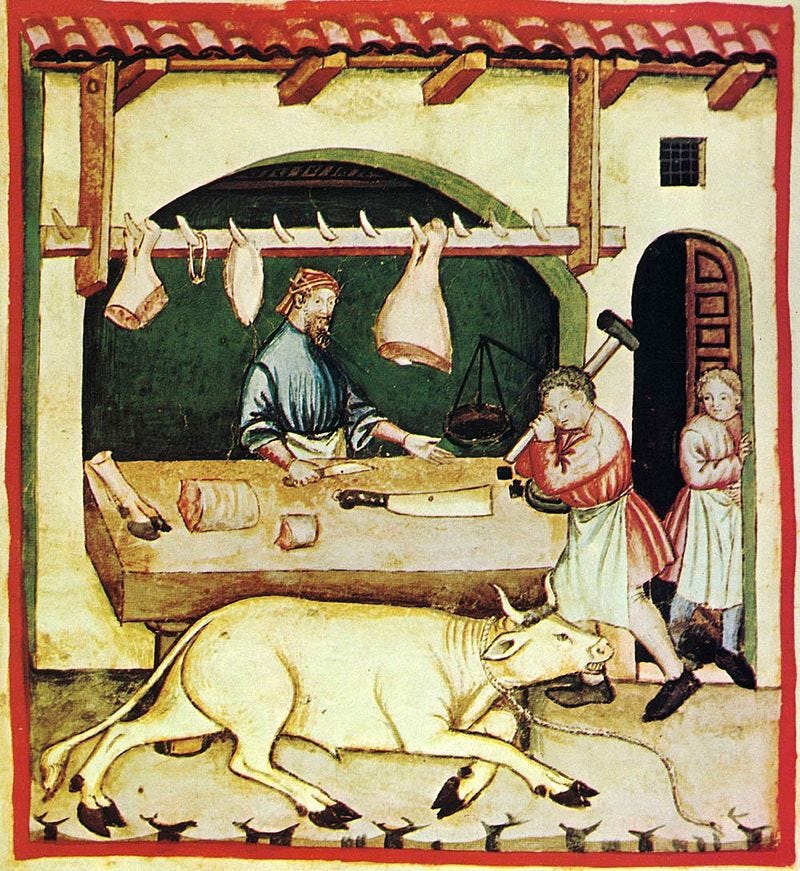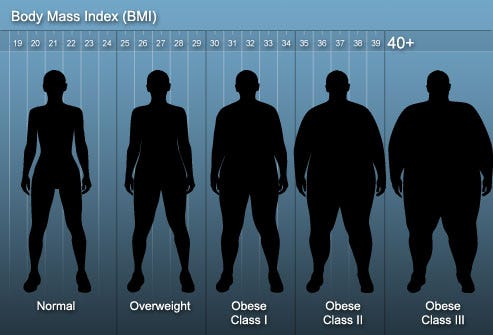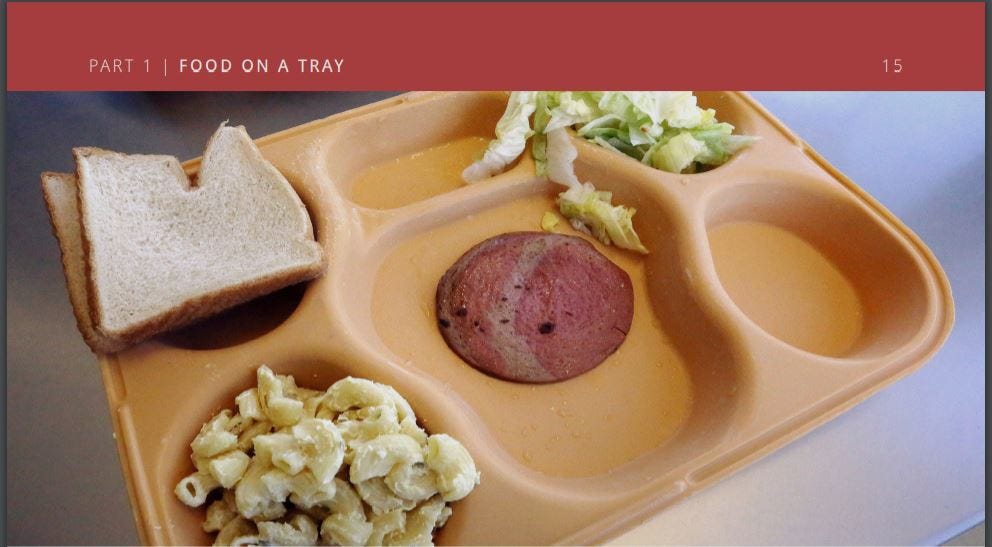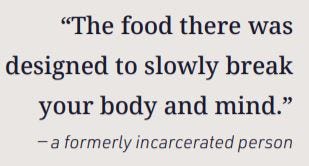The Prison Dining room is open ... lunch is served.
Mr. Qanon Shaman ... here is your organic carrot ...
Prison food was recently in the news, thanks to Qanon Shaman. We all remember him …
The issue was predictably politicized in unhelpful ways, but I’ll get to that in a minute.
Breakfast, lunch, and dinner is a complicated affair in prison. It’s not just about the food, but, in the beginning, it’s also about navigating the social space and just the simple question as to where to sit. You need to be able to "read" people to see how they might or might not feel about you. It’s four to a table. You pick up your tray at the door, and you walk back and find an open seat. That was the part I dreaded. You have to look around, and see where others are comfortable having you sit next to them, and where you feel comfortable sitting next to. It's a bit like high school all over again, only worse. There were fewer inmates than seats in J pod, so I tried to sit in the least crowded space possible. Is the seating by race? By age? By ethnicity? By crime? What? It takes a few days to learn to “read the room”.
Yes, the food may be nothing to write home about, but it's not as bad as some have made it out to be, and needlessly politicized. State jail food can differ from state to state, and even county to county. How much they can afford is partly a function of the tax base for that county. State prison food can vary from state to state, but the state system is more uniform than the county jail system. The federal prison has the highest, or at least a more uniform, standard for prison food, requiring some nutritional minimum.
I had a decision to make. I used to be a vegetarian, even a vegan at one point, but that was too difficult for me to maintain. Before I went to prison I had settled on the occasional chicken and fish, but no beef and no pork. I cannot honestly morally defend even eating chicken and fish, at least the industrialized farming kind, but beef and pork have always been simply out of the question. Eating anything as intelligent as a cat or a dog is very hard to defend, but the modern industrialized system of slaughterhouses is not defensible, although it has improved a great deal. It’s quite possible that slaughtering was more humane back in the “old days” since it was so much more visible.
(Researchers like Temple Grandin in Colorado have done a great deal to make slaughterhouses more humane. I sometimes think that slaughterhouses should be completely transparent and should be in the middle of town! Modern society has disconnected us from what we eat. But this is not always the case. Artisanal butchers in France post pictures of the cow on the window of their shop. You know where it came from, and what it was fed, and where it was slaughtered. Egg cartons from free-range chickens often have a picture of the farmer on the box, sometimes holding a chicken in her arms! it's reassuring for the buyer! It’s also more expensive.)
But while in county jail I decided to try to be as close to a vegetarian as I could be, not the easiest choice under the circumstances. The menu was a variety of things that made for a more or less different meal for about 3 or 4 weeks before the menu started over again. It seemed to me to be a "balanced" meal in the sense of trying to give nutritional servings consisting of fruits, vegetables, dairy, and meat. These meals were not always the freshest in the world, but it is a prison after all. After a while, it became clear that the tray was a kind of miniature "food pyramid", albeit made with the cheapest ingredients possible. Inmates frequently complained about the food, but the biggest complaint was not about the quality, but about the quantity. They “hated” the food, but wanted more of it! The real problem is that the jail menu is based on a 2000 cal diet, whereas the average adult male needs about 2500 calories per day, depending on his activities. But the average American male typically eats much more than this. There's a reason why there's a chronic problem with obesity in the US, and it's evident in prison as well. I saw very few "normal" looking people in jail. Nearly everyone was at least overweight, but more towards being seriously overweight, obese, and even morbidly obese. At least half the population I saw looked more like the middle three body types below:
The honest truth is that nearly everyone in jail lost weight. They needed to. And they felt better because of it. Unfortunately, many gain it back when they get out.
This kind of seriously unappetizing tray was actually fairly rare but tends to be a bit more frequent in poorer county jails.
More typical would be a tray like this …
No - it’s not the most appetizing - but it’s prison. It’s edible. And often enough the food is good, and sometimes even excellent! Especially holiday meals like Thanksgiving, Christmas, and July 4rth! And don’t get me started on the bread pudding! That was the best! (I pilfered this picture from a YouTuber video, Afterprisonshow, and he does a great job on prison life.)
Breakfast, lunch, and dinner became a kind of central organizing principle of daily prison life. The menu for the day was closely scrutinized to see what could be traded for other food, or bartered for non-food items later on. This trading and bartering was not technically allowed, but it was tolerated within reason. The most prized items were certain desserts and meats. The least prized were vegetable-related food. Not all meats are equal. Highly processed meats like bologna was not especially valued, but things like chicken patties, sausages, and then occasional hamburger fetched the highest price.
Is it possible to eat healthy in prison? I believe it is. Let me suggest that Bill Cosby has exactly the right attitude. He entered prison weighing in at 220 lbs. But he decided to use that opportunity to lose some much-needed weight and dropped to 187 lbs. How did he do it? The TMZ magazine headline shows exactly how:
This (composite) picture of Bill Cosby speaks to me because that’s exactly what I did, especially in jail. I wasn’t overweight, at about 150 lbs, but probably lost about 8 lbs in the process. I traded my deserts (puddings and cookies were highly prized!) and my meats for vegetables, fruits, coffee, and paper and golf pencil when the need arose. All this bellyaching about how horrible prison food leaves me completely unmoved. If you enter prison with a defeatist attitude, you will be defeated. I traded cookies and pudding for writing pads like this one below; for months on end, I wrote with golf pencils like this one!
But the dominant narrative these days is evident in this kind of headline which is both unfortunate and seriously misleading …
This strikes me as doubly unfortunate because Leslie Soble is part of a team that has otherwise produced a report on prison food which is worth a look, even though it is systematically undermined by relentless racializing and politicizing, and by its chronic use of systematically biased anecdotes. It is now a tired cliché, but it is still true: the plural of “anecdote” is not “data”. This “report” makes it seem as if everyone else is responsible, except for inmates themselves. It seems that only the department of corrections is to be held accountable, but at no point is it ever suggested that the inmate can actually exercise some agency over his own food choices and consumption, even in prison. It is as if his health was entirely in the hands of the DOC. This is nothing short of infantilizing inmates. It helps no one, except the crew that produced this distorted report.
Eating Behind Bars: Ending the Hidden Punishment of Food in Prison is the first national investigation of its kind. This six-part report explores the inequities and troubling trends in prison food, centering the perspectives of people who have been incarcerated while also examining food services policies and practices that affect more than 1.3 million people incarcerated in state prisons nationwide.
The troubling trend is less in prison food than it is in food choices that many Americans make in society, and this is reflected in the incoming inmate population. In my view, the notion that the judge granting Qanon Shaman his “organic diet” is somehow a “glaring example of white privilege and racial injustice” is not just nonsense, but nonsense on stilts! CNN did not clearly report the facts since he merely wanted to have access to the same religious exemptions that other groups are routinely granted. He had to go on a hunger strike for 8 days before his right was finally granted. The judge noted the following in his ruling:
As the DOC explicitly acknowledged at today’s hearing—and despite its claims about the compelling need to adhere to a uniform diet for prisoners—the DOC provides dietary religious exemptions for both Muslim and Jewish inmates. Its sole rationale for withholding an analogous accommodation for defendant is that his religious views lack “religious merit.” But that derisive language simply underscores the fact that not only is the DOC withholding a religious exemption for defendant that it already grants to other religious prisoners, but that it is doing so simply because defendant belongs to a disfavored sect. Indeed, the DOC could not even marshal a single example at today’s hearing in which it had denied any other dietary religious exemption for lacking “religious merit.”1 The implication, then, is that if defendant belonged to some other favored sect, he would not have had to seek a federal court order to gain recognition of his religious rights.
From the legal decision granting a religious exemption
It is clearly a bad faith argument to suppose that Jacob Chansley - aka Qanon Shaman - was the beneficiary of “white privilege”. (It’s worth noting that Muslim inmates were sometimes seen to have special exemptions and privileges that fostered some resentment in the general population, especially when the “yard” had to close early because of Ramadan. Most Muslims were black and brown persons. Some inmates were Muslims for a while; then vegans; then pagans; then other religions! They were like religious tourists, sampling the various dietary trays available at DOC!)
But when the judge made his decision, the reaction was predictable.
The group at “Impact/Justice.org” asked the question:
Why can’t all incarcerated people get an organic diet?
January 14, 2021
Recent news buzzed about how Jake Angeli, the Capitol attack suspect known as the “QAnon Shaman,” would receive a court-ordered diet of organic food to suit his “religious” and health needs while in federal custody in Arizona.
There is something very wrong with this picture. A white extremist who helped lead an insurrection against the United States demands special treatment, and his request is immediately fulfilled by a judge, even though there is no known religion that requires an organic diet. Meanwhile, millions of disproportionately Black, brown, and other people of color are subject to dehumanizing and unhealthy food in prisons and jails every day. It is impossible to ignore the blatant racial disparity and white privilege involved in this.
Why can't all incarcerated people get an organic diet?
A number of points need to be made: 1) To call anyone a “white extremist” is to connote him harboring some sort of “white supremacists” beliefs, even though there is no evidence (that I am aware of) that he has any such beliefs. He does indeed follow the bizarre views of Qanon, but also has some strange views about “infinite quantum energy” that is being hidden in secret laboratories! 2) His dietary requests were not “immediately fulfilled” and he had to go on a hunger strike for 8 days to make his point. 3) There is no reason to think that he “lead an insurrection” - he quite simply walked in the building and started shouting “freedom”! 4) As far as there being no “known religion” requiring an organic diet, I refer you back to the judge’s ruling. 5) However “not great” prison food may be, “dehumanizing” is not the first word that comes to mind, having eaten prison food for nearly 5 years myself!
But they continue on this relentless march, beating the same drum …
Impact Justice’s recent report Eating Behind Bars: Ending the Hidden Punishment of Food in Prison details the profound consequences of the typical prison diet on physical and mental health, with deleterious effects that ripple out beyond the individual to impact families, communities, and society as a whole. Incarcerated people are typically fed meals low in essential nutrients and loaded with salt, sugar, and refined carbohydrates—a diet proven to cause heart attacks, diabetes, and hypertension, to name just a few diseases. Unsurprisingly, almost one in ten people incarcerated in the U.S. have heart disease, about the same number have diabetes, and almost one-third have hypertension.
They do not in fact detail any such “profound consequences” of prison diet beyond the actual consequences of being incarcerated in the first place. Prison food is neither here nor there for the most part. It is not the relevant variable.
The sad truth is that the vast majority of inmates were already unhealthy and overweight to begin with when they first arrived in prison, with similar rates of obesity as the average American. The further truth is that many of them lose weight while in jail or in prison, (and smokers quit smoking in jail since it’s not possible to smoke in jail), and often become healthier, at least those who make a conscientious effort to do so. It is possible to do so in prison. But the sadder truth is that most regain that weight when they get out, and many go back to smoking and become just as unhealthy as they were before. People make bad decisions before, during, and after prison. Again, prison food is not the relevant variable. (One hates to have to say what that variable is, but sooner or later, someone will have to. It’s the elephant in the room no one wants to talk about, but in due course, I shall take up the issue).
( For an in-depth and scientifically informed account, I suggest the following: The Effect of Incarceration on Adult Male BMI Trajectories, United States, 1981–2006.)
The Effect of Incarceration on long-term health outcome
But the dominant narrative continues …
While Angeli is treated to organic, specially prepared meals as he awaits trial for illegally and violently storming the Capitol, in most of the nation’s prisons and jails, food that is unhealthy, often unsafe, and frequently too disgusting to eat is killing people from the inside out. Rather than focusing on Angeli’s extreme white privilege, this incident should illuminate the millions of currently and formerly incarcerated people, their families, and their communities who are impacted by an unjust food system with punishing effects that last long beyond the time a sentence is served. Our prison food system is the product of human design and it is within our power to change it.
This notion of “an unjust food system” and “extreme white privilege” strikes me as mostly absurd, and has little or no merit whatsoever, and the claim that prison food is somehow supremely “unhealthy, often unsafe, and frequently too disgusting to eat is killing people from the inside out” is based on no serious evidence that I can see beyond a collection of strictly negative anecdotes from former inmates. This is not an empowering narrative, it’s a disempowering one. It encourages inmates, be they black, brown, white or purple, to see themselves as victims of the “prison food system”. Could it be that the fault is not in our stars, but in ourselves?
At some point, we have to be masters of our own fate, even in prison. But this prison food report from Impact Justice highlights claims like these:
This kind of defeatist and victimhood narrative would not matter much were it not for the fact that it pollutes the public discourse and fuels an ongoing culture war that will have consequences politically and in terms of policy further down the line. But it’s toxic even to those inmates who are encouraged to see themselves in this way, namely purely as a victim of “the system”. There is a point at which people start identifying themselves under the social categories that are socially constructed for them, and they behave accordingly, especially when there is an incentive to do so.
This is nothing new. The process even has a fancy name: “Dynamic Nominalism”, made popular by Ian Hacking, a philosopher, in an influential essay, Making up People. (Actually, commentators say it’s an influential essay, thereby justifying their own comments. Who would want to comment on an insignificant essay!?)
Professor Hacking’s point is a simple one: How you classify people - for good or ill - can matter to those thus classified.
These reflections on the classification of people are a species of nominalism. But traditional nominalism is static. Mine is dynamic; I am interested in how names interact with the named. The first dynamic nominalist may have been Nietzsche. An aphorism in The Gay Science begins: 'There is something that causes me the greatest difficulty, and continues to do so without relief: unspeakably more depends on what things are called than on what they are.' It ends: 'Creating new names and assessments and apparent truths is enough to create new 'things'.' Making up people would be a special case of this phenomenon.
Rocks don’t much care how they are classified. But people do. This is one reason why this persistent victimhood narrative, of encouraging some people to constantly see themselves as helpless victims of a suffocating and oppressive system where their own individual agency and autonomy makes no difference is not really an empowering narrative at all, and in the end just counterproductive. I spent 5 years in prison; I was deported; I have been labeled. But I am not a victim; I am not powerless, and I am not that label. And under no condition did prison food ever “break my body and my mind”.
(On a personal note, I have lived in France for over two years now, but this toxic verbiage is beginning to infect the discourse here as well. It was quite a shock for me to hear this kind of talk from two French high school students speaking about “white privilege”, while they themselves were attending a private high school …. to the tune of 30,000 euros a year … both students were black, but somehow oblivious to the enormous class privilege they enjoyed).
Let me suggest an alternative hypothesis about Mr. Angeli. Qanon Shaman - far from enjoying "white privilege" is likely to face some very serious prison time. But I would guess that it might be worse than that. It takes only a few minutes of listening to him to understand that his mental health could be in doubt. He has long-standing beliefs, some would say delusions, about conspiracy theories, predating Trump, and Qanon was just yet another delusional belief that he added to his preexisting arsenal of seriously weird beliefs. He has been demonized for no good reason that I can see. He strikes me as more in need of a psychiatrist than jail. But at this point, he has become a character in a narrative about “white privilege”, and "white supremacy", and “systemic racism” in the US, one that will be very difficult to undo, and is beginning to play itself out on the world stage. It’s a bad movie that will soon be showing on the European continent as well.
Mr. Shaman … dinner is served … enjoy your organic carrot …













